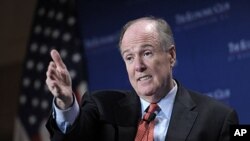The White House says talks President Barack Obama's national security advisor had with Israeli leaders underscored that the United States and Israel share the same objective of preventing Iran from acquiring nuclear weapons.
National Security Advisor Tom Donilon's three day visit to Israel occurred amid increasing tensions between Israel and Iran, including media speculation about a possible Israeli preemptive strike, and statements by U.S. and European leaders urging more time for a diplomatic solution.
Donilon met with Prime Minister Netanyahu, Defense Minister Ehud Barak, and with Donilon's Israeli counterpart General Yaakov Admiror as well as with Israel Defense Forces Chief of the General Staff Benny Gantz.
White House statements have emphasized close U.S.-Israel consultations, saying the Donilon talks addressed "the full range of security issues of mutual concern" and stressed the "unshakeable" U.S. commitment to Israel’s security.
On Tuesday, White House Press Secretary Jay Carney was asked whether as Israeli and other media reports have said, Donilon carried a specific message to Israel that more time is needed to allow efforts for a diplomatic solution.
The United States and Israel, he said, "share the same objective" of preventing Iran from acquiring a nuclear weapon, adding that President Obama's approach of intensifying sanctions has left Iran more isolated and its economy severely affected.
The problem remains Iranian behavior, Carney said, repeating what Mr. Obama has said about there being time for a diplomatic resolution.
"There is time and space for diplomacy to work, for the effective sanctions to result in a change in Iranian behavior, an agreement by Iran to live up to its obligations, to engage in negotiations, and resolve this matter peacefully," said Carney. "We do not, of course, as we have said many times, take any option off the table."
Israeli media reports said that during his visit Donilon urged Israeli leaders not to launch an attack on Iranian nuclear facilities and to allow international sanctions more time to work.
The Jerusalem Post newspaper quoted Israeli Defense Minister Barak as saying after the talks that the United States and Israel are sovereign countries - "each one responsible in the final analysis for the decisions it takes for itself and about its future."
Jay Carney also commented about Israeli concerns over Iran's nuclear program.
"We share the concerns strongly that Israel has about the potential development by Iran of a nuclear weapon," he said. "We share those concerns. And we certainly understand the heightened concern that Israel has given its geographic location and other circumstances that are involved here for Israel."
Britain's Foreign Secretary William Hague recently urged Israel to give more time for sanctions to work, and the top U.S. military official, Joint Chiefs of Staff Chairman Army General Martin Dempsey, said any Israeli attack on Iran at this point would not be prudent.
A senior Iranian military commander has said Iran might launch a preemptive strike against its "enemies" if it feels it is about to be attacked.
Israeli Prime Minister Netanyahu is scheduled to meet with President Obama at the White House on March 5. The two leaders are expected to address the largest pro-Israel group in the United States, speeches that will be closely watched amid the intense global concerns over Israeli-Iranian tensions.
| Join the conversation on our social journalism site - Middle East Voices. Follow our Middle East reports on Twitter and discuss them on our Facebook page. |





